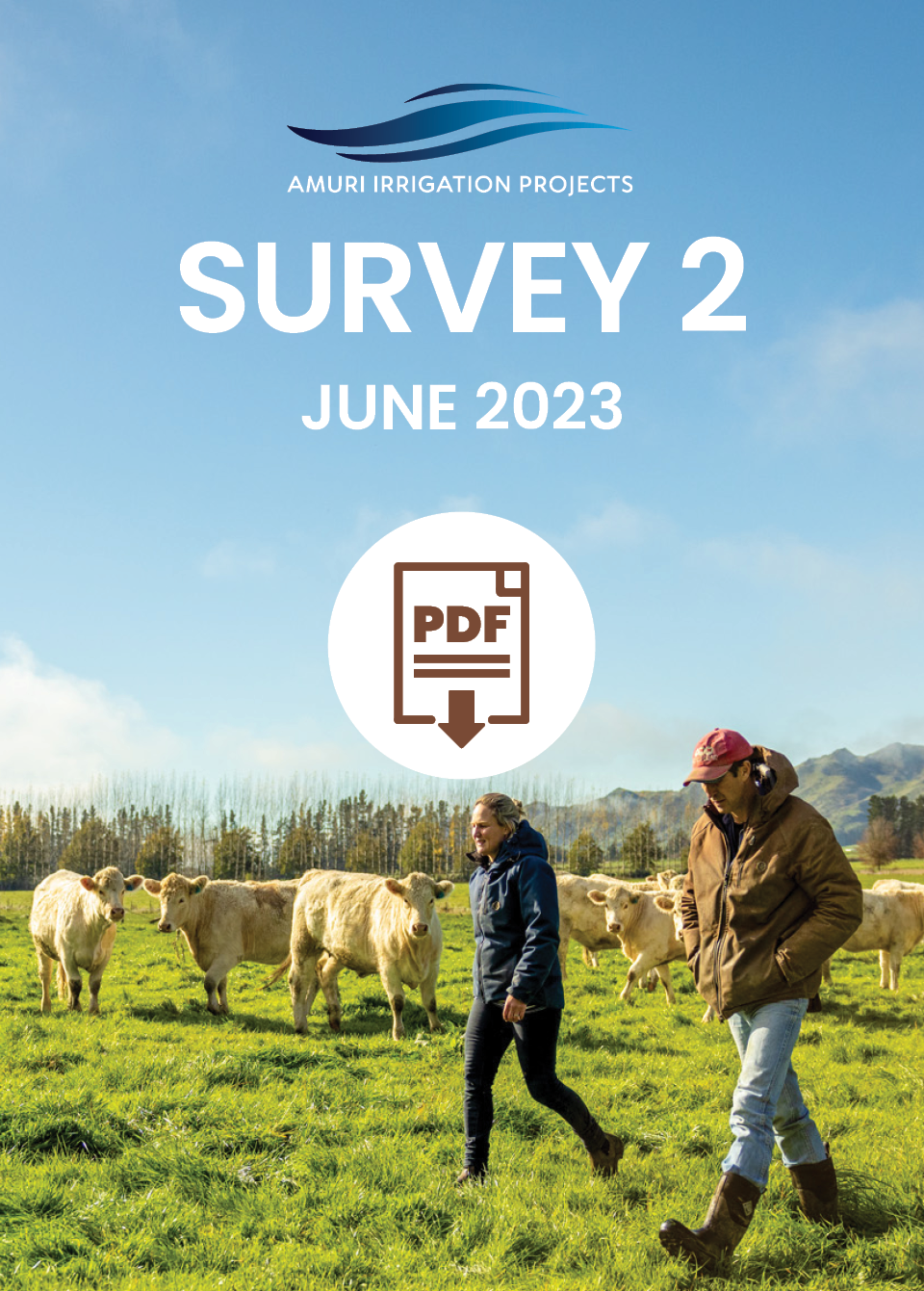
Amuri Basin Future Farming
Amuri Basin Future Farming will help farmers collectively decide what farming into the future looks like for them. This four-year partnership led by Amuri Irrigation builds on our existing strategy to farm beyond regulatory minimums. Alongside our project partners Ministry for Primary Industries (through the Sustainable Food and Fibre Futures fund), Environment Canterbury and DairyNZ, we are building on our environmental work to develop and implement a farmer-led strategy for sustainable farming, with a combined focus on environment, farm viability and community resilience.
THIS IS THE AMURI BASIN FARMING PROJECT
MEET SAM & VIKI - CATCHMENT GROUP LEADERS
Project Partners
AIC successfully obtained funding through the Ministry for Primary Industries’ Sustainable Food and Fibre Futures fund. AIC is also supported by project partners Environment Canterbury and DairyNZ.
Our partners directly contribute resources to help ensure the success of the project; this is either through funding or in-kind contribution such as provision of subject matter experts, assistance with events, reviews of technical material, and strategy or governance input.
Project Details
-
The farmland in the Amuri Basin has undergone extensive change over the last 50 years. From dryland to borderdyke, then borderdyke to spray irrigation. More recently water races have been filled in as part of a move toward water use efficiency. This drive for efficiency has improved on-farm performance, exceeded industry standards, and generally encouraged a ‘doing more with less’ approach. However, land use intensity and the way water moves through the Basin has meant that nutrient concentrations in many ground and surface water sites have increased. This issue didn’t appear overnight, and it will take some time to address. This is the next stage of our journey.
-
The project contains three elements.
Farmers will be divided into catchment groups based on their farming location and work together to address environmental issues and risks associated with their farming business. A facilitated process will develop specific goals and action plans with each group.
While farmers are working in groups, AIC will utilise all the technical data it holds, which has been gathered over many years to develop a risk-based modelling system showing what on-farm and catchment-based mitigations, such as wetlands and bioreactors can achieve. This will make sure we have the right solutions in the right place and take us further down the road of improving our water quality and environmental outcomes.
The third component of the project will be developing and trialling a way to use dollar values (price) to fairly encourage all our farmers to actively and collectively manage our farms and water use on an ongoing basis. This should incentivise our farmers to lead change, by providing the signals to take action before a regulatory framework is needed.
-
The Project is designed to achieve:
A cohesive and motivated farming community ready to collectively tackle the challenges ahead, with the ability to accurately measure and report on progress.
A desire to continue taking farming in the Amuri Basin beyond regulatory minimums.
Accelerated improvements in freshwater ecosystem health and cultural outcomes, through optimised use of natural resources, whilst ensuring profitable farming and community resilience in the Amuri Basin.
Farmers who have the skills and knowledge to tackle their farming challenges.
-
Currently, the project is planned for four years, with the intention that the outcomes become a permanent way of working for the catchment groups involved. Ideally, this would be driven by the farmers, but AIC would continue to invest and manage any scaled mitigation opportunities and drive performance. We know that protecting and enhancing our shareholder’s land is important for their businesses and our community into the future.
-
Farmers have been divided into small groups based on their geographical location to address environmental challenges and the risks associated with how they farm. They will address specific challenges for their catchment supported by input from technical experts.
The aim is to have all landowners as part of the discussion groups to contribute to outcomes for the whole catchment.
Groups meet 3-4 times a year to discuss their action plan, review the progress they are making, and establish new goals as required. In addition, other project activities such as field days and workshops will be delivered focusing on subjects identified by the groups.
-
There is a Project Governance Group, made up of two AIC directors and representatives from our Project Partners, MPI and Environment Canterbury. The project is managed internally by the AIC team and contracted external parties. The Project sits within AIC’s operating budget for each financial year. A workplan is developed on a six-monthly basis to ensure it remains flexible and responsive to the requirements of our farmer groups and their vision, as well as ensuring we can deliver the Project’s other significant workstreams.
-
The Project regularly produces Milestone Reports which we provide to our Project Partners.
The Project will gauge our farmers’ knowledge, attitudes, skills and aspirations through structured surveys and small group interviews. The data from these surveys and interviews will provide the evaluation framework to ensure we are meeting the Project outcomes and can adapt our workstreams to meet the needs of our farmers and the community.
-
AIC and our shareholders will be well equipped to participate in the 2027 Plan Review process and be geared towards the consent renewal pathway for 2033. A successful project will bring accelerated improvements in ecosystem health, whilst ensuring viable farming and community resilience in the Amuri Basin. Farmers will have a greater understanding of cultural matters, biodiversity, efficient and real-time resource benchmarking, and water quality. There will be on-going conversations across the community on continuous improvement and collaboration. Lessons learned from the project could be replicated throughout New Zealand, especially those within irrigated environments.
Project Stories
AIC IN THE COMMUNITY WITH DAVID & TANIA
CRITICAL SOURCE AREAS WITH BEN
WINTER MANAGEMENT PLANNING WITH SOPHIE
FEEDING AND PADDOCK STRATEGIES WITH MATT & SCOTT
Farmer Group Locations
Who can I contact about the Project?
-

Mike Hennessy
ENVIRONMENTAL PROJECTS LEAD
027 7066 787
Like to know more?
You can contact the Project Team on the details provided above, or send us an email direct to: futurefarming@amuriirrigation.co.nz
Alternatively, feel free to fill out the form and we’ll respond to your message within 24 hours.













